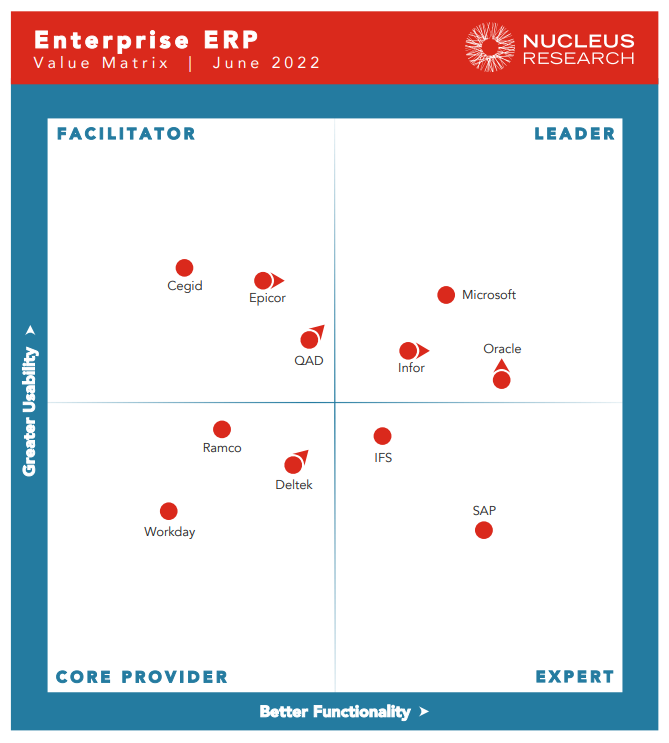The ERP Value Matrix is a well-known ERP ranking and evaluation report published annually by none other than the equally famous, market-leading technology research and analysis firm, Nucleus Research.
Read more: Everything you need to know about ERP solutions
Contents
- The Enterprise ERP Value Matrix in 2022
- Leaders in the Enterprise ERP Technology Value Matrix
The Enterprise ERP Value Matrix in 2022
This year, for the first time, there are two report versions: the Enterprise ERP Value Matrix and the SMB ERP Value Matrix. The difference between these two lies in the amount of annual revenue on the functionality and usability of the ERP solutions, as described by the customers.
The Enterprise ERP Value Matrix ranks ERP vendors that serve organisations with more than $500 million in annual revenue. The SMB ERP Value Matrix used the same criteria to rank ERP vendors that serve organisations with annual revenue ranging from $10 million to $499 million.
The Matrix provides a snapshot to help customers and prospects explore various ERP options currently available on the market, as well as help them understand how these vendors differentiate, deliver value, and invest in new products.
Compared to last year's Value Matrix, it is no surprise that Tier 1 ERP vendors are in the 'Leader' quadrant. Microsoft, Infor, and Oracle are the names that remain market-leading vendors in both 2021 and 2022.
Read more: Here's What You Need To Know About Top ERP Vendors
Leaders in the Enterprise ERP Technology Value Matrix
Infor
Infor is one of the leaders of both the Enterprise and SMB ERP Technology Value Matrix this year, recognised for its industry-specific ERP solutions deployable in the cloud through its CloudSuite platform.
Infor's modular CloudSuite platform provides targeted industries with SCM, CRM, human resource planning, product lifecycle management, warehouse management, asset management, and financial and accounting functionalities.
Not only are Infor's ERP solutions vertical-specific, but they also provide flexible deployment options such as cloud, hybrid, and on-premise. Infor LN and Infor M3 are primarily aimed at large enterprises, whereas Infor Systeline and Infor SXe are more suitable for small and mid-market businesses.
The flexibility in deployment method combined with industry-specific functionalities has set Infor apart from other leaders in the quadrant.
Read more: An Overview of End-to-End ERP System Infor CloudSuite Industrial
Infor has released various notable product enhancements in the last year, including:
- Smarter manufacturing capabilities by leveraging knowledge and expertise from the acquisition of Lighthouse Systems, a manufacturing execution system (MES).
- Launching the Infor Marketplace in January 2022 to showcase the industry and micro-vertical pre-integrated solutions and platform-built technologies that supplement and directly integrate with Infor products, such as niche industry functionality, enhanced extensions, and reusable widgets.
- Adding deeper, far beyond traditional integration to the Infor Nexus for CloudSuite.
- Introducing variable-driven CFO dashboards to CloudSuite systems, empowering customers to centrally organise financial and operational data and gain insights from fiscal intelligence.
- Announcing new cultivator contract support features so that CloudSuite customers will benefit from additional settlement options, such as self-billing and requests for supplier invoicing based on grade-based pricing.
Microsoft
Besides Infor, Microsoft is another long-reigning leader in Nucleus' ERP Technology Value Matrix. This year, this global company's Dynamics 365 Finance and Supply Chain Management were recognised as the leading ERP solutions in the Enterprise category.
With its worldwide reach and a long history of providing comprehensive enterprise application solutions, including integration-platform-as-a-service and the Azure cloud service, Microsoft Dynamics 365 Finance and Supply Chain Management is one of the top-of-mind considerations among many large-scale businesses.
Read more: Single ERP suite vs best-of-breed systems, which strategy is better?
In addition to the core finance and supply management capabilities, customers also have access to features like business logistics, manufacturing process performance indicators, and a regulatory compliance engine. All of these are available on a single integrated platform with flexible deployment methods.
Recent updates and announcements for Dynamics 365 Finance include:
- Introducing Finance insights to optimise customers' financial processes with intelligent automation.
- Introducing globalisation services for additional localisations.
- Introducing a market preview of a tax audit and reporting service.
Recent updates and announcements for Supply Chain Management include:
- Introducing several initiatives, such as external MES data unification and real-time inventory, to improve visibility within and beyond the enterprise.
- Introducing Planning Optimisation add-on for priority-based supply planning and automation of the replenishment of high-demand items.
Read more: 7 Questions for CEO before Starting an ERP Project
Oracle
Oracle Fusion Cloud ERP is recognised for its unified ERP platform that supports organisations with high transaction activity and complex finance and accounting structures while offering robust database management functionality.
Oracle Cloud ERP is a popular choice for the education, healthcare, high technology, communications, retail, manufacturing, professional and financial services, government, and consumer goods sectors.
Its core functionalities comprise financials, project management, procurement, performance management, risk management and compliance, subscription management, supply chain and manufacturing, and analytics. All are industry-specific and delivered through a no-code interface.
Oracle Cloud ERP, especially when combined with native integrations across Oracle Fusion Cloud Applications, attracts customers looking to consolidate their technology ecosystem.
Oracle announced several enhancements that will be implemented to Oracle Fusion Cloud ERP in 2022 to advance their three-pronged Cloud ERP vision:
- Expanded automated accrual delivery for a daily pro forma view and implemented supplier invoices for Touchless Operations.
- Introduced Connected Planning for Continuous Insights to ensure continuous alignment of assumptions with sales and marketing, supply chain, HR, and IT.
- Announced two new capabilities: Intelligent Performance Management and Predictive Cash Forecasting.
- Introduced direct in-app virtual collaboration via video conferencing platforms for Proactive Collaboration & Steering, which is generally available with its digital assistant and collaborative platform hooks with Microsoft Teams and Slack.
 English
English  Vietnamese
Vietnamese 



